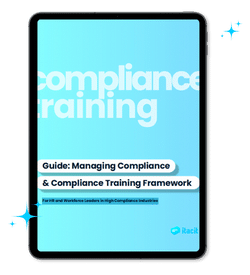eCommerce isn’t just for Amazon. Having a fully integrated eCommerce LMS can take your employee learning applications and digital workplace to the next level.
How? That’s a great question. Let’s dive into how employee training programs can benefit from premium, paid courseware and how integrated payments can streamline systems for you. We’ll also share how your employees will benefit from the convenience of one-stop shopping for training and certifications – all to improve the employee learning experience.
What is an eCommerce LMS integration?
First off, even if eCommerce for your LMS might sound like an unfamiliar term, it’s actually something you’re probably very familiar with.
Thinking along those lines of Shopify and Amazon, eCommerce (or e-commerce) is all about purchasing, sourcing and selling online. So, whenever you order something online from a website or app, even if it’s groceries to be delivered, you’re interacting with eCommerce.
Convenient, right?
Now, when it comes to eCommerce for the L&D world, it refers to integrating a payment gateway in an LMS to buy courses for enrolling employees into training. It can also be used as a revenue stream, by making online learning material available to external customers for a set price. It’s all about the business of eLearning and adding value to the development of courses.
How is an eCommerce LMS different than a normal LMS?
Digital Learning Institute’s 2022 report placed course creation right up at the first spot of its main features for an LMS. On top of this, other industry reports have highlighted items like the increasing value of online courses for organizations, the massive amount of companies switching to eLearning, and the efficiency benefits for employee learners.
But, even with a learning management system (LMS) fully rolled out, your organization could still be missing one of the key pieces to having the best learning experience in 2022: an eCommerce LMS integration.
When you’re using an LMS for compliance training, your training benefits from being digital, accessible, and customizable. This is great for employees, whether they’re working on the front-line or in the office. Ideally, your LMS already comes with:
- A great user interface that’s easy to use
- Targeted learning
- A mobile app
- Microlearning features
- Analytics and reporting
All of these capabilities are what makes an LMS such a great offering for the digital workforce. But what if you want the option to easily add in courses from external vendors? Or what about third-party training or certifications that your employees need to complete annually? Are there other payments you need to collect from employees like uniforms or fees?
An eCommerce integration refers to the convenient add-on functionality that gives your employees the ability to access training and certification programs from the same LMS system they’re used to. The same LMS that you – the employer – provide for free.
Using a single platform (and single employee transcript) is the best way to make the employee learning experience completely seamless and accessible.
Why the employee learning experience needs eCommerce
When you live in a larger city, it’s often easy to run out and find exactly what you need from the wide choice of stores and shops.
However, the scenario of not being able to find what you need, and instead turning to online vendors, is becoming much more common. We’re seeing a rapidly-growing amount of the population taking their shopping online.
Learning and employee training isn’t much different. With the wide variety of material available online that’s covering almost any industry or occupation one can dream of, turning to vendors is a great choice for organizations who need to train a workforce with a variety of certification and training needs.
Applications for LMS eCommerce Integration in Employee Training
Cost-sharing for Professional Development Opportunities
Being able to create courses right in the LMS is an excellent and convenient feature, but building on that with an eCommerce integration expands an organization’s catalog to new levels. When you have an eCommerce LMS integration, it’s easier than ever to make sure every team is as skilled as possible.
For example, you could offer specialized training to your sales team for career advancement at a discounted price using a promo code. This cost-sharing promotes professional development learning with content that would be otherwise cost-prohibitive on your learning platform. And, for L&D leaders, they can offer a more robust catalog of courses through their LMS as an additional service for employees.
Make certifications and re-licensing more convenient
There are many perks that come with plugging in eCommerce to an employee learning management system.
For employees, the biggest advantage is a more convenient learning experience. Consider, for example, that your warehouse employee requires an annual forklift certificate as a condition of employment. The course is offered through a third party, but your team needs to validate the certificate on an annual basis. With an eCommerce LMS integration, the purchase transaction can happen through your LMS with the employee paying via credit card, conducting their training through the system, and your L&D team having a complete training record that’s up to date in real-time.
Enabling this eCommerce feature means critical employee-paid training will always be the best available, and they’ll be able to complete every certification and compliance course without worrying about missing out on any necessary or updated training.
Managers and system administrators will also continue to have a great user experience, with any added courses working with their existing data, analytics and tracking tools.
Process other payments
The convenience of eCommerce integration doesn’t just end at training, courses, and certifications. With your LMS equipped with an easy and instant method of payment, employers can offer their staff a range of products that they can buy through a secure shopping cart.
Give employees direct access to items like employee uniforms and branded clothing, tickets to special events, or discounts on sports and fitness memberships. Payment is made directly inside the LMS, eliminating the need for HR leaders and office managers to handle card or cash payments.
Employer Benefits of LMS eCommerce Integration
Are you convinced that a streamlined LMS integrated with eCommerce has a significant benefit for employees? We hope so! Now, you may be asking what are the direct benefits for the organization. Rest assured, there are plenty!
Single system for paid and unpaid training
You already have an LMS that your employees are used to and your team leaders understand how to assign training, modify modules, and pull analytics. Without eCommerce integration, any external or third-party digital training would be disconnected from your trusty LMS.
Incorporating eCommerce allows for complete integration of internal training, and paid courses purchased from vendors, all available to employees with one account and one single sign in.
Single employee transcript
All employee training and certification courses under one roof means that there is only one, single employee training transcript. No more searching across platforms for completed courses and manually compiling transcripts.
Improved learning experience = better retention
All in all, eCommerce integration gives employees access to the best possible learning experience. It makes your LMS more flexible, more customizable, and ultimately more agile to meet the needs of each individual.
It’s been shown that employers who offer their staff a strong culture of learning and development have better retention rates. The more robust your LMS can be, the better the chance your organization has to attract and retain top talent.
eLearning in 2022 needs eCommerce LMS integration on your digital transformation roadmap
An eCommerce LMS integration or an eLearning authoring tool can do so much, from boosting the selling of courses to giving employees access to entire new libraries of training.
Whether you’re an LMS user who will be leveraging eCommerce to source better training, or a leader who wants to improve the learning experience, you need to put eCommerce on your learning and development transformation roadmap.










